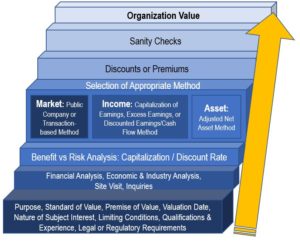Value – The First Variable in Your Selling Equation By Brian Goodhart Value is the first variable in your selling equation and for good reason – it is the one talked about the most and the metric by which most people determine the success or failure of a deal. In order to adequately discuss value, …
Category: Valuation
Credit Unions: Valuation and M&A Transactions
Whether due to merger, expansion, or investment, an understanding of the processes and techniques of valuation is crucial for the effective growth and solid financial performance of credit unions. Capstone Managing Director John Dearing and Manager Anna Kochkina break down the multifaceted valuation process in CUInsight. https://www.cuinsight.com/credit-unions-valuation-and-ma-transactions.html
Credit Unions: Valuation Process Steps
With the rising number of credit union mergers, the increasing interest in acquisitions of community banks and branches, as well as investments in fintechs by credit unions and CUSOs, understanding valuation – processes and techniques – has become increasingly crucial for successful growth and solid financial performance. Valuation Process Steps Highlighted below are some of …
3 Business Valuation Methods for When You’re Ready to Sell
In my last 30 years of helping companies grow, one of the most common questions I have come across is “how much is my company worth?”. Bringing together the financial (valuation) and non-financial (evaluation) pieces of the puzzle will help you determine the value of a company. Valuation refers to the economic value you place …
Valuation of Today’s CUSO: Capstone Interview on CUbroadcast
Capstone’s John Dearing recently spoke to Mike Lawson of CUbroadcast at the 2018 NACUSO Network Conference. The interview covers key points from John’s breakout session with Guy Messick “What Is Your CUSO Worth? Valuation for CUSOs and Marketplace Trends.” In case you missed the live interview, you can watch the recording on the CUbroadcast website. In this …
Does the Highest Bidder Always Win the Deal?
The short answer to this question is no. Some owners may sell to the highest bidder, but this is not always the case. Differentiating by price alone is problematic for a number of reasons, the most obvious being that someone can always outbid you. In addition, when it comes to privately-held transactions, especially, we find …
What Is Your CUSO Worth? Find Out at the 2018 NACUSO Network Conference
Are you planning to sell or buy ownership units in a CUSO? Are you making an initial offering for a new CUSO? Are you an existing company that intends to become a CUSO by selling ownership units? Will your CUSO buy a business or merge with another CUSO? If any of these situations applies to …
How to Navigate Today’s High Valuation Multiples
Valuation multiples in the middle market are “unprecedented” due to low interest rates, relatively cheap debt available in today’s market, and high amounts of dry powder chasing the same deals. According to GF Data, average valuations reached 7.4 times, the highest quarterly mark the data base has recorded in 15 years. With such high valuations, …
How to Verify an Acquisition Target’s Unaudited Financials
Obtaining audited financial statements is always best when valuing an acquisition prospect. An audit enhances your confidence and ensures what management has presented is a “true and fair” view of the company’s financial performance and position. We run into plenty of privately-held, middle market companies that don’t have audited financial statements. Many have their financial …
What Is the Guideline Public Company Method in Valuation?
The Guideline Public Company (GPC) Method is one of the more popular valuation methodologies because people often hear about it in the news or in presentations. This method identifies prices for individual shares of publicly traded companies that are subject to the same industry dynamics as the subject company (the company you are trying to …


